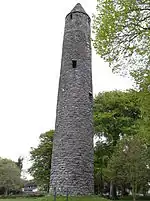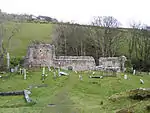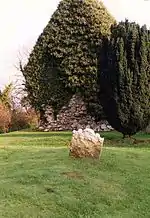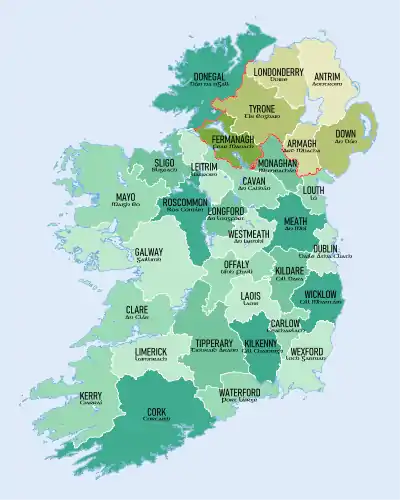List of monastic houses in County Antrim
Inclusion
In this article, smaller establishments such as monastic cells and notable monastic granges (particularly those with resident monks) and camerae of the military orders of monks (Knights Templars and Knights Hospitallers) are included. The numerous monastic hospitals per se are not included here unless at some time the foundation had, or was purported to have, the status or function of an abbey, priory, friary or preceptory/commandery.
Article layout
Communities/provenance: shows the status and communities existing at each establishment, together with such dates as have been established as well as the fate of the establishment after dissolution, and the current status of the site.
Formal name or dedication: shows the formal name of the establishment or the person in whose name the church is dedicated, where known.
Alternative names: some of the establishments have had alternative names over the course of time. In order to assist in text-searching such alternatives in name or spelling have been provided.
Abbreviations and Key
Locations with names in italics indicate probable duplication (misidentification with another location) or non-existent foundations (either erroneous reference or proposed foundation never implemented).
|
Alphabetical listing of establishments

(approx.)
(approx.)
(site)
(approx.)
(approx.)
(approx.)
(approx.)
(approx.)
(approx.)
| Foundation | Image | Communities & Provenance | Formal Name or Dedication & Alternative Names | Online References & Location |
|---|---|---|---|---|
| Aghnakilla Monastery ø | supposed early monastery dissolved before 11th century | Achad-cinn; Achad-na-cille; Aughnakeely | [1][2] 54°54′34″N 6°23′41″W (approx) | |
| Antrim Monastery |  |
Gaelic monks possibly founded by St Comgall of Bangor; plundered 824; plundered 1018; destroyed 1147 |
Oen-truib; Aen-truib; Aentreb; Aontruibh; Eantrobh; Oentrebh | [3] 54°43′26″N 6°12′32″W |
| Ardclinis Friary ø | tradition of house of Franciscan Friars, Third Order Regular — evidence lacking | [4] 55°03′23″N 6°00′40″W | ||
| Armoy Monastery ø |  |
supposed early monastery, founded by St Olcan; dissolved before 11th century |
Airthir-maige; Domnach-; Ethirmoy | [5][6] 55°08′05″N 6°18′38″W |
| Ballycastle Friary ≈ | building called 'abbey', apparently built 1612 by Randal Mac Donnell, Earl of Antrim; standing until the Reformation; probably Bonamargy Friary (v. infra) |
|||
| Ballyprior Priory | Premonstratensian Canons — from Woodburn (community founded at Woodburn before 1326); transferred here 1542-3; dissolved after 1565 |
Magee Island Priory | [7][8] 54°50′05″N 5°44′25″W | |
| Bonamargy Friary, Ballycastle |  |
Franciscan Friars, Third Order Regular founded c.1500 (c.1475) by Rory MacQuillan, Lord of Reute (or Mac Donell); dissolved 1584; burned 1589; granted to the descendants of the founder Franciscan Friars, First Order Regular repaired & re-occupied at the petition of Father Conor Mac a'Bhaird, as a rest centre for missionaries 1626-1642, restored 1931; (NIEA) |
Bunanmargaigh | [9] 55°12′07″N 6°13′52″W |
| Carrickfergus Abbey | Premonstratensian Canons daughter house of Dryburgh; priory founded before c.1183; raised to abbey status 1212; dissolved after 1320-6; succeeded by Woodburn (v. infra) |
|||
| Carrickfergus Friary # | Franciscan Friars Minor, Conventual founded 1232-48 by Hugh Lacy, Earl of Ulster; Observant Franciscan Friars reformed 1497; dissolved 1540; restored by Queen Mary 1557; friars expelled 1560; granted to Sir Edmund Fitzgerald, who assigned it to Sir Arthur Chichester, who built a castle on site 1610; used as a munitions store, rebuilt as Joymount House 1618; new house built by friars 1626 |
Carrac-fergusa; Cragfargas; Gracfergos; Grafergosensis | 54°42′56″N 5°48′19″W | |
| Church Island Monastery, Lough Beg | 54°47′24″N 6°29′05″W | |||
| Church Island Abbey, Lough Beg | ||||
| Clondrumalis Abbey ~≈? | Premonstratensian Canons, possibly located in County Antrim, possibly Woodburn | Woodburn? | ||
| Cluain Monastery ø+ | supposed early monastery founded by St Oclan; dissolved before 11th century; C.I. parish church built on site |
Kilcluain; Cell-chluaine | [10] | |
| Connor Monastery | church probably founded early 6th century by Mac Nissi (St Macnisse) (Oengus or Coemahan Breac); episcopal diocesan cathedral; diocese united with Down 1453 |
Coinnere; Condere; Coinnee | [11] 54°48′26″N 6°12′45″W | |
| Cranfield Monastery | early monastic site, patron St Eoghan; by tradition the burial place of St Olcan |
Maigi Cremc; Cremh-caille; Ecclesiaa de Crewill | [12][13][14] 54°42′15″N 6°21′49″W | |
| Culfeightrin Monastery ø | supposed early monastery founded 5th century by St Patrick; dissolved before 11th century |
Culechtrann; Kilfeutre; Magherintemple | [15][16] 55°11′32″N 6°12′44″W | |
| Drumeeny Monastery ø | supposed early monastery early monastic site, monks; founded 5th century by St Patrick, who left bishop Enan in charge; dissolved before 11th century |
Druim-findich; Druim-indeich; Druim Findich, Enán in; inDruim [Fh]indich, Enán; Ecclesia de Drum-Indich; Killeena Gobbin's Heir Castle | [17][18][19][20] 55°10′59″N 6°13′19″W | |
| Druim La Croix Abbey | Premonstratensian Canons daughter house of Dryburgh; founded before c.1250; dissolved after 1320-6; succeeded by Woodburn (v. infra) |
Druim La Croix; White Abbey | [21] 54°40′05″N 5°54′30″W | |
| Drumtullagh Monastery | grange founded 5th century by St Patrick | Telagh-Ceneoil-Oingusa; Tulach | [22][23] 55°09′31″N 6°23′35″W (approx) | |
| Dundesert Monastery | early monastic site, monks; coptic tradition? |
Disert Ilidh? Disert Uilaigh? | [24][25][26] 54°37′33″N 6°12′13″W | |
| Dunseverick Monastery | early monastic site, monks founded 5th century by St Patrick; first taken by Norsemen 871; destroyed 926 |
Dun-sebuirgi; Dun-sobairche | 55°14′14″N 6°26′30″W (approx) | |
| Erdamh Monastery ~ | early monastic site, suggested to be County Antrim[notes 1] | |||
| Glenarm Friary |  |
Franciscan Friars, Third Order Regular founded 1465 by Robert Bissett, cousin of Robert Bissett, Provincial of the Third Order in Ireland; dissolved during the reign of Queen Elizabeth?; granted to Alexander MacDonnell, ancestor to the Earl of Antrim; site now occupied by St. Patrick's C.I. parish church |
Gleann-arm | [27][28] 54°58′05″N 5°57′16″W |
| Glenavy Monastery | early monastic site founded by St Patrick; patron St Aidan, son of Colga; by tradition the burial place of the three daughters of St Comgall founder of Bangor Monastery |
Laathrach Patraic Lennewy,Ecclesia de,cum capella Lettir-phadruic Gleann Abhaich Lann Abhaigh | [29][30][31] 54°35′39″N 6°12′57″W | |
| Glynn Monastery | early monastic site monks; church founded 5th century by St Patrick |
Glinn Glenn-Fineachta; Glenn-Indechta | [32] 54°49′21″N 5°49′11″W (approx) | |
| Inispollan Monastery | early monastic site, monks in existence 5th century, in the time of St Patrick |
Inis-pollen | 55°07′15″N 6°04′15″W (approx) | |
| Inver Friary | Franciscan Friars, Third Order Regular founded 1500 by a Scottish nobleman, Phelim O'Neil; dissolved during the reign of Queen Elizabeth? also erroneously given as Inver, County Donegal; granted to James V. Claneboys |
54°50′51″N 5°50′24″W (approx) | ||
| Kells Abbey | purportedly founded before 514 (in the time of St Macnise); apparently a hermitage by 828 of Ceallach mac Condmaigh, anchorite of Disirt Ceallaigh (possible confusion with same place name in County Galway); Augustinian Canons Regular — Arroasian? founded after 1140; destroyed 1316 by Edward Bruce; rebuilt early 15th century?; dissolved 1 February 1542, surrendered to the commissioners of Henry VIII; extant remains on site of textile factory |
St Mary; The Augustinian monastery of Saint John the Baptist (1415) ____________________ Disert Abbey; de Diserto fonte-Conneri; Ceneles | 54°48′35″N 6°13′14″W (approx) | |
| Kilboedain Monastery ~ | early monastic site, monks church founded by St Boedan, abbot |
Cell-baedain; Cell-buadain; Kilscoba; possibly Ballywodan in Ardquin, or Ballibodan; Eiloseoba | ||
| Kilroot Monastery | early monastic site, founded in or after 412 by St Colman who was sent by St Ailbe of Emly | Cell-ruaid; Cell-ruad | 54°43′46″N 5°45′42″W (approx) | |
| Lambeg Friary | Franciscan Friars, Third Order Regular founded c.1500 by Phelim O'Neil (or M'Donnell); dissolved before 1572, probably destroyed by O'Neil to prevent use as a fort by the English |
Lambegg Friary; Limbeg Friary | [33] 54°31′55″N 6°01′01″W | |
| Layd Friary ø |  |
tradition of church now ruined belonging to Franciscan Friars purportedly founded by the sept of McFall (Macfaull) evidence lacking; also suggested as nuns or Dominican Friars |
Lead; Lede; Port Obe | [34] 55°05′31″N 6°03′00″W |
| Linally Monastery | erroneous reference to Lynally, County Offaly | |||
| Linn Monastery | early monastic site, nuns | |||
| Magheramorne Monastery | early monastic site, monks founded 5th century by St Patrick |
Domnach-mor-maige-damoerna | 54°48′49″N 5°46′03″W | |
| Massereene Friary | Franciscan Friars, Third Order Regular founded 1500 by Phelim O'Neil; dissolved during the reign of Queen Elizabeth?; granted to Sir Arthur Chichester, Baron of Belfast 1621 |
Mas-a-rioghna; Masraona; Masseryne; Masevin | [35] 54°42′30″N 6°13′43″W (approx) | |
| Muckamore Monastery # | Gaelic monks founded 585? (550) By St Colman Elo |
Mag-comair; Moccumur; Mocmur; Mucimore; Muckmore; Mugcomuir | [36] 54°42′05″N 6°11′20″W | |
| Muckamore Priory | Augustinian Canons Regular — Victorine founded before 1185; dissolved 1540-1; granted to the Longford family 1639; thatched house built on site 17th century replaced by house built and landscaped gardens before 1833, extant, without public access | |||
| Portglenone Abbey Church * | Cistercian monks, O.C.S.O. founded 1948 from Baltinglass Abbey, Co Waterford; extant |
Abbey of Our Lady of Bethlehem, Portglenone; | [37] 54°52′13″N 6°28′31″W | |
| Portmore Monastery Ballinderry |
 |
early monastic site, founded 6th century by St Lua; St Lua known in Scotland as St Moluag |
Laloo; Lann Lua; La Lu | [38][39][40] 54°33′01″N 6°16′29″W |
| Portmuck 'Abbey' | Cistercian monks apparently a grange of Inch |
|||
| Rams Island Monastery | early monastic site, monks founded before 1056? by Gormgal? |
Inis-darcairgrenn in Loch-n-Echach; Lann-Abhaid; Inisgatden | [41] 54°35′06″N 6°18′20″W | |
| Rashee Monastery | early monastic site, founded 5th century by St Patrick | Raith-sithe; Rath-sithe | [42][43] 54°46′20″N 6°01′28″W (approx) | |
| Rath-easpuic-innic Monastery | early monastic site, founded 5th century by St Patrick | Raith-Epscuip-Fhindich; Capella de Corcrib; Corgrippe; Gortgrib | [44][45][46] 54°35′13″N 5°50′22″W (approx) | |
| Rathlin Monastery | _-_geograph.org.uk_-_818545.jpg.webp) |
attempted foundation c.546 by St Comgal of Bangor thwarted when driven away by armed men; church of Rechrann (identified as Rathlin[notes 2]) founded 635 by Segene, Abbot of Iona; burned by Norsemen 795; Reachru (identified as Rathlin[notes 3]) plundered 1038; possession of the island gained by Earl of Essex, Lord Deputy, 1558 |
Reachrain; Raghera; Rachlainn; Rachlin; Rachlin Island; Raghlin | [47][48] 55°17′36″N 6°11′52″W |
| Rathmore Monastery | suggested to be Ratheaspuicinnic,[notes 4] an early fortress[notes 5] | |||
| Serade Kaill and Bedamegcan Friary ~ | Franciscan Friars, Third Order Regular founded 1445, Archdeacon of Connor appointed to license the building of a monastery by Eugenius IV; dissolved ? |
Bademeghcadab Straid Friary? | ||
| Skerry Monastery | founded by St. Patrick; mentioned by Tírechan c.670 as - ad montem Scirte ad locum petrae.. vestigium pedis; N/E of the old church ruins lies a patch of rock with a depression known as St Patrick's footprint; close by the church is Tubernacool holy well; Slemish mountain lies two miles south-east across the river Braid valley. |
Schire Padruic; Shirec Archaille; rock of Skirit; Schirich | [49][50][51][52] 54°54′50″N 6°08′45″W | |
| Templepatrick Preceptory ø | town said to be named for a Knights Hospitaller foundation — evidence lacking | Villa Hugonis de Logan | ||
| Woodburn Abbey | Premonstratensian Canons daughter house of Dryburgh, Scotland; founded before 1326 (1242), by John de Courcy, in succession to Carrickfergus and Druim La Croix (v. supra); dissolved 1 March 1542 [sic] (1542-3), surrendered to the commissioners of Henry VIII; canons transferred to Ballyprior; partly demolished after 1558; site now occupied by Carrickfergus Industrial Centre |
The Holy Trinity; St Mary; ____________________ Goodborn Priory | [53] 54°42′29″N 5°50′12″W | |
Map link to lists of monastic houses in Ireland by county
 Click on a county to go to the corresponding article |
Notes
- Mervyn Archdall, Monasticon Hibernicum, 1786, however not mentioned by W. Reeves, Ecclesiastical Antiquities of Down, Connor and Dromore, 1847
- Rathlin — identified with Rechrann by J. O'Donovan (identifications from notes in the Annals of the Four Masters, edited by J. O'Donnovan, 1848-51) and W. Reeves, Ecclesiastical Antiquities of Down, Connor and Dromore, 1847
- Rathlin — identified with Reachru by J. O'Donovan (identifications from notes in the Annals of the Four Masters, ed. J. O'Donnovan, 1848-51)
- Rathmore identified as Ratheaspuicinnic — M. Archdall, Monasticon Hibernicum, 1786
- Ratheaspuicinnic — W. Reeves, Ecclesiastical Antiquities of Down, Connor and Dromore, 1847, pp.279-81
References
- "Place Names NI - Home". www.placenamesni.org. Retrieved 31 July 2017.
- Mervyn Archdall (1873). Monasticon Hibernicum. W. B. Kelly. pp. 1–.
- Schorr, Frank. "Antrim Irish Round Tower". www.roundtowers.org. Retrieved 31 July 2017.
- http://larnehistoricchurchtrail.co.uk/churches/ardclinis/
- "Armoy Round Tower - County Antrim". www.oracleireland.com. Retrieved 31 July 2017.
- "Place Names NI - Home". www.placenamesni.org. Retrieved 31 July 2017.
- "Place Names NI - Home". www.placenamesni.org. Retrieved 31 July 2017.
- "Place Names NI - Home". www.placenamesni.org. Retrieved 31 July 2017.
- "Bonamargy Friary". www.northantrim.com. Retrieved 31 July 2017.
- Carlisle, Nicholas (31 July 2017). "A Topographical Dictionary of Ireland: Exhibiting the Names of the Several Cities, Towns, Parishes, and Villages ... Collected from the Most Authentic Documents, and Arranged in Alphabetical Order. Being a Continuation of the Topography of the United Kingdom of Great Britain and Ireland". W. Miller. Retrieved 31 July 2017 – via Google Books.
- William REEVES (Bishop of Down.) (1847). Ecclesiastical Antiquities of Down, Connor and Dromore, consisting of a taxation of those dioceses, compiled in the year 1306, with notes and illustrations. Hodges & Smith. p. 223.
- "Place Names NI - Home". www.placenamesni.org. Retrieved 31 July 2017.
- http://www.antrimtown.co.uk/Cranfield%20Church.htm
- Samuel Lewis (1837). A Topographical Dictionary of Ireland. S. Lewis. pp. 432–.
- Saint Patrick; Aeterna Press (22 April 2014). The Life and Writings of Saint Patrick. pp. 379–.
- "Ecclesiastical antiquities of Down, Connor, and Dromore, consisting of a taxation of those dioceses, compiled in the year MCCCVI.; with notes and illustrations". archive.org. Retrieved 31 July 2017.
- "Place Names NI - Home". www.placenamesni.org. Retrieved 31 July 2017.
- William Reeves (1847). Ecclesiastical Antiquities of Down, Connor, and Dormore: Consisting of Those Dioceses, Compiled in the Year MCCCVI; with Notes and Illustrations. Hodges and Smith. pp. 285–.
- John Borbridge DOYLE (1855). Tours in Ulster: a hand-book to the antiquities and scenery of the North of Ireland. pp. 233–.
- "Archived copy". Archived from the original on 2008-12-01. Retrieved 2009-08-07.CS1 maint: archived copy as title (link)
- "Place Names NI - Home". www.placenamesni.org. Retrieved 31 July 2017.
- "The Granges of County Antrim". 18 November 2005. Retrieved 31 July 2017.
- "Place Names NI - Home". www.placenamesni.org. Retrieved 31 July 2017.
- "On the Trail of Seven Coptic Monks in Ireland - The British Orthodox Church". britishorthodox.org. Retrieved 31 July 2017.
- Leslie Hardinge (1 June 1995). The Celtic Church in Britain. TEACH Services, Inc. pp. 171–. ISBN 978-1-57258-034-3.
- Ray Simpson (9 July 2014). Aidan of Lindisfarne: Irish Flame Warms a New World. Wipf and Stock Publishers. pp. 179–. ISBN 978-1-63087-315-8.
- "Glenarm Friary - Larne Historic Church Trail". larnehistoricchurchtrail.co.uk. Retrieved 31 July 2017.
- "GLENARM FRIARY AND THE BISSETS by Hector Mc Donnell". 25 June 2013. Retrieved 31 July 2017.
- "Place Names NI - Home". www.placenamesni.org. Retrieved 31 July 2017.
- "Glenavy Past and Present - Lisburn.com". www.lisburn.com. Retrieved 31 July 2017.
- William REEVES (Bishop of Down.) (1847). Ecclesiastical Antiquities of Down, Connor and Dromore. Hodges & Smith. p. 47.
- "Ecclesiastical antiquities of Down, Connor, and Dromore, consisting of a taxation of those dioceses, compiled in the year MCCCVI.; with notes and illustrations". archive.org. Retrieved 31 July 2017.
- Foundation, Ulster Historical; brian.smith@brssystems.com, Brian Smith -. "History From Headstones". www.historyfromheadstones.com. Retrieved 31 July 2017.
- http://www.discovernorthernireland.com/Layd-Old-Church-Cushendall-P2820
- "Excavations.ie. Searchable database of Irish excavation reports". Retrieved 31 July 2017.
- "Excavations.ie. Searchable database of Irish excavation reports". Retrieved 31 July 2017.
- "Our Lady Of Bethlehem Abbey Portglenone". Retrieved 31 July 2017.
- "Place Names NI - Home". www.placenamesni.org. Retrieved 31 July 2017.
- "Middle Church Ballinderry - Lisburn.com". www.lisburn.com. Retrieved 31 July 2017.
- "Jeremy Taylor and Killultagh (pt2)". anextractofreflection.blogspot.co.uk. Retrieved 31 July 2017.
- http://www.bnfc.org.uk/New_Site_BNFC/Rams_Island_Archaeology.html
- "Rashee Old Graveyard, Co. Antrim - Doagh Ancestry & Townlands". Retrieved 31 July 2017.
- William Reeves(Bishop of Down.) (1847). Ecclesiastical Antiquities of Down, Connor and Dromore. p. 68.
- O'Laverty, Monsignor James (31 July 2017). "Antiquarian Jottings". Ulster Journal of Archaeology. 11 (1): 18–24. JSTOR 20608563.
- "Place Names NI - Home". www.placenamesni.org. Retrieved 31 July 2017.
- "Ecclesiastical antiquities of Down, Connor, and Dromore, consisting of a taxation of those dioceses, compiled in the year MCCCVI.; with notes and illustrations". archive.org. Retrieved 31 July 2017.
- http://www.ballintoy.connor.anglican.org/rathlin%20church.html
- "Fejl: Siden blev ikke fundet / adgang er ikke tilladt". Vikingeskibsmuseet Roskilde. Retrieved 31 July 2017.
- "Place Names NI - Home". www.placenamesni.org. Retrieved 31 July 2017.
- William REEVES (Bishop of Down.) (1847). Ecclesiastical Antiquities of Down, Connor and Dromore, consisting of a taxation of those dioceses, compiled in the year 1306, with notes and illustrations. Hodges & Smith. p. 83.
- Saint Patrick; Aeterna Press. The Life and Writings of Saint Patrick. Aeterna Press. pp. 61–. GGKEY:97TB9D60CJE.
- "megalithomania: Skerry (Antrim) :: Church :: Visit notes". www.megalithomania.com. Retrieved 31 July 2017.
- "Saint Nicholas Church, Carrickfergus". www.saintnicholas.org.uk. Retrieved 31 July 2017.
